LATEST NEWS


Why is the nation more bitterly divided today than it’s been in 80 years? Why is there more anger, vituperation and political polarization now than even during Joe McCarthy’s anti-communist witch hunts of the 1950s, the tempestuous struggle for civil rights in the 1960s, the divisive Vietnam war or the Watergate scandal?
If anything, you’d think this would be an era of relative calm. The Soviet Union has disappeared and the Cold War is over. The civil rights struggle continues, but at least we now have a black middle class and even a black President. While the wars in Iraq and Afghanistan have been controversial, the all-volunteer army means young Americans aren’t being dragged off to war against their will. And although politicians continue to generate scandals, the transgressions don’t threaten the integrity of our government as did Watergate.
And yet, by almost every measure, Americans are angrier today.


As Labor Day approaches, here’s a question that many opponents of immigration reform don’t want to answer honestly: Can you be for the middle class and against comprehensive immigration reform? The answer is no — a fact that creates all kinds of problems for those lobbying to stop legislation that would create a path to citizenship for millions of undocumented immigrants.
Foes of immigration reform like to position themselves as true-blue patriots acting in the best interests of the country. But it’s hard to square that image with opposition to legislation that, more than any other single act, could help rebuild the nation’s middle class.
It’s obvious to most people that immigration reform would improve economic conditions for undocumented immigrants. After all, while most immigrants come here in search of a better life, their legal status often relegates them to low-wage jobs with few if any benefits and unsafe workplace conditions.
» Read more about: Immigration Reform Debate: Facts v. Bad-Faith Arguments »


It’s summer and gasoline prices have peaked — a certain sign that it’s vacation time. Except for those who don’t get vacations or, worse, get them but don’t take them.
Since about a quarter of this country’s workforce earns only minimum wage or holds down a job (or two) at less than full-time hours, a large number of families do not benefit from paid vacations at all. Add in the number of self-employed who only take a vacation if they can earn enough to set aside the money, and vacations, which much of the middle class has always taken for granted, have suddenly become out of reach for a large number of families. If they take any time off, it costs them money they need to survive.
More than three-quarters of Americans say they live paycheck to paycheck, which means taking a vacation even for the middle class means going into debt.


Readers who have fought for social justice while waging a home-front war with parents who hold views diametrically opposed to theirs will take heart in Madeline Janis’ op-ed in Sunday’s Los Angeles Times.
The opinion piece, “Dad, Rush Limbaugh and Me,” is a wry meditation on family and political beliefs that was prompted by the recent death of the author’s father. However, the story specifically springs from an incident that occurred when Janis, who is the Los Angeles Alliance for a New Economy’s national policy director, helped move her father to an assisted living facility several months ago. She writes:
On the day we were packing, with both of us understandably on edge, I came across a stash of Rush Limbaugh caps, maybe half a dozen of them, each with a different year printed on the front. I couldn’t let it pass.
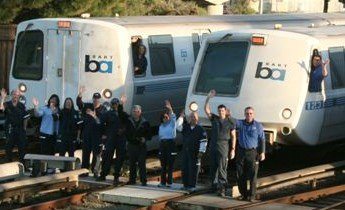

I’ve seen some pretty outrageous anti-worker opinion pieces written about the contract negotiations at Bay Area Rapid Transit (BART) over the last two months. But nothing I’ve read is as infuriating as a San Francisco Chronicle op-ed from Chuck and Barbara McFadden.
In short, the McFaddens assert that workers like those at BART are not deserving of the middle-class wage their unions negotiate. To make their point, they use an argument that’s all too common today — private sector workers are suffering so public sector workers should too. What’s so absurd about this logic is that the very reason so many private sector workers are struggling is because most don’t have the ability to bargain with their employer for a decent wage in return for a hard day’s work.
Workers should be able to negotiate with their employers over wages and benefits like health care and retirement security.
» Read more about: Scapegoating of BART Employees Continues »
OMG! Was Gene Autry, the “singing cowboy” on TV and in the movies, really a radical?
I just discovered this Autry recording of the pro-labor song “The Death of Mother Jones,” about the great radical union organizer — Mary Harris Jones, sometimes called the “most dangerous woman in America” by her enemies — who died at 100 in 1930. Autry recorded the song in February 1931 during the Great Depression. It is so obviously pro-union that there’s no way Autry couldn’t have known what it meant.
Like many baby-boomers, I grew up watching Autry in his cowboy films and his popular television show. He was famous for singing cowboy songs like “Back in the Saddle” and “Tumbling Tumbleweeds,” as well as popular hits like “Rudolph the Red-Nosed Reindeer,” “Here Comes Peter Cottontail,” and “Frosty the Snowman.”
In the 1930s, 1940s and 1950s, he was one of Hollywood’s biggest stars.
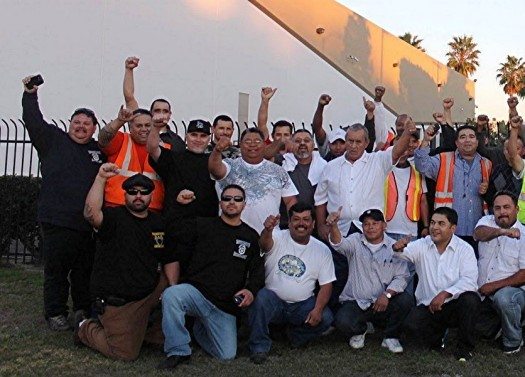
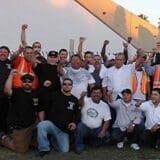
Los Angeles Port Drivers and workers across America all have one thing in common: We are working harder than ever but struggling just to get by.
Our economy is stalled out. Households in the middle have seen their income slashed relative to today’s cost of living, and the new jobs being created don’t pay enough for people to make ends meet. That’s why workers at the ports of Los Angeles and Long Beach, and across America, are joining together to demand a fair wage and the right to form a union without retaliation.
Los Angeles’ port drivers are fighting for a wage that will allow them to cover their basic needs and help get our economy moving again. For port drivers working at Green Fleet Systems in Carson, California, their effort to form a union has been met with fierce resistance and illegal retaliation.* Drivers have had enough and are stepping up their fight for justice,
» Read more about: Port Drivers Send Message to Green Fleet Systems »


Writing on the building outside the Palmer House Hotel in downtown Chicago says “igniting passions since 1871.” The American Legislative Exchange Council (ALEC) held its 40th anniversary conference at the hotel, igniting the passions of protesters who came out to inveigh against ALEC’s agenda during a demonstration August 8.
Birthed in Chicago, ALEC first met in September 1973. As a 501(c)(3) nonprofit it has tax-exempt status. ALEC “also develops model bills and resolutions on economic issues,” as the organization’s website states, noting that those bills “can be helpful resources” for legislators pursuing privatization of public services.
To kick off the conference, ALEC arranged to have British Parliament member Conor Burns speak at a leadership dinner August 6 before major meeting events the following three days. An ALEC meeting program notes Burns’ relationship with the late Margaret Thatcher, renowned for gutting public projects. He reportedly “visited Lady Thatcher at her home every Sunday evening for drinks [and] developed a close bond.”


There’s nothing quite like being targeted by Tea Party members to show that you’re on to something good. This realization came to Jason López Urena during a State Assembly hearing yesterday on legislation that would spur affordable housing and support the creation of good jobs.
“It felt good to be attacked by the Tea Party – people are against it but they don’t know why,” said López of the legislation. “They said we are communists because we want to give back to the people.”
López, a 19-year-old college student and community activist who sits on the board of the nonprofit Women in Non-Traditional Employment Roles, was part of a small delegation that traveled to Sacramento to advocate for SB1 (Steinberg), a bill that would create a Sustainable Communities Investment Authority in areas near transit hubs. Their efforts were rewarded when the Assembly’s Local Government Committee approved the bill with a 6-3 vote,
» Read more about: Capitol Steps: CA Moves One Step Closer to Funding Affordable Housing »


The baby was lifted in its flowing shroud
And carried through the red-lit streets,
Floating above the raised fists of men
In headcloths. The wrapped body a cloud,
Pall burden so light, it seemed weightless
Crowning the mad cortege. That shape
Once living in her arms—that shape
I mirrored, newborn at my breast. Shroud
So light it became an unsupportable weight,
As TIME fell open before me. I was the street
Going up in flames, but couldn’t see it, in the cloud
Of fire, her face. What dark veil or wall of men
Hid her? TIME opened to the images of men.
I couldn’t see her; just her grief, unraveling shape,
White streaming from the breast. That cloud
Of chants, bitter witness to the small shroud
Held high. She stood away from the fiery street—
The monument of her shadow,
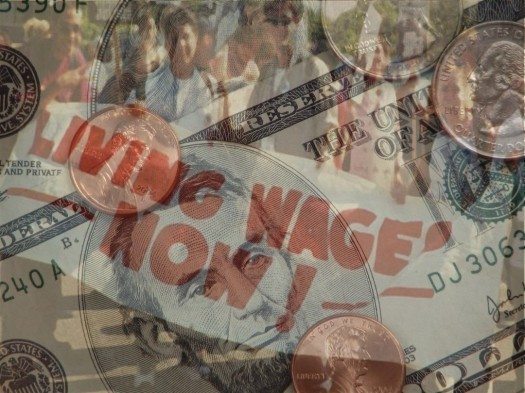

Through the years, the centerpiece of living wage campaigns has generally been a focus on fairness and economic justice for workers. And rightly so. Successful living wage campaigns have resulted in critical gains for workers and their families, bringing everything from increased economic security to improved access to quality health care. These material gains have meant a world of difference for real people and have helped lift thousands out of poverty to achieve a decent standard of living – something we all deserve, regardless of the work we do.
But a living wage is not just about improving the quality of life for individual workers — it can also be a powerful mechanism for stimulating local economies, boosting local businesses and confronting the growing problem of poverty in our communities.
A new report released this week by the Los Angeles Alliance for a New Economy (LAANE) approaches the idea of a living wage from this perspective and examines how improved wages and benefits for thousands of L.A.’s hotel workers have the potential to help bring economic renewal to our neighborhoods and our city as a whole.
» Read more about: Living Wages: Good for Business, Good for L.A. »
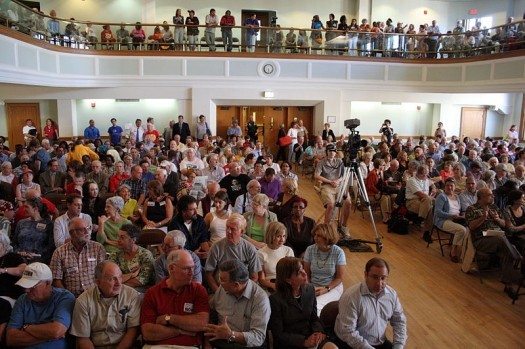

The future of immigration reform could well to be decided in the next three weeks. And this will occur not in the halls of Congress but in Congressional Town Hall meetings across the nation. Anti-immigrant activists are hoping for a replay of the Tea Party’s successful August 2009 attacks on health care reform; by triggering loud public confrontations with Congressmembers in normally placid Town Hall meetings, conservative activists led the media to wrongly conclude that reform lacked public support. But in 2013, progressives are prepared. Immigrant rights activists believe they can use the Town Halls to expose the strength of their support and propel immigration reform to passage. Considering that both sides are prepared and the key element of surprise is lacking, whose activist strategies will prevail?
As even President Obama acknowledges, the passage of immigration reform comes down to whether Speaker John Boehner will allow a House vote. A majority of House members would support the Senate bill if given the chance,
» Read more about: Path to Citizenship Passes Through Town Hall Meetings »


The issues of immigration and workers’ rights are inextricably linked, as seen in the participation of 30 L.A. labor unions in today’s Citizenship Caravan to Bakersfield. The unions are joining organizations from all over California to call for immigration reform with a path to citizenship.
A less widely known example of this link is an obscure immigration program that is being used by irresponsible companies in ways probably not envisioned by the government. One of those companies is located here in Southern California and is locked in a labor dispute with its employees.
The EB-5 investor program connects wealthy immigrants with U.S. businesses seeking capital. Run by the U.S. Citizenship and Immigration Services agency (USCIS), its stated purpose is to “stimulate the U.S. economy through job creation and capital investment by foreign investors.”
In exchange for a million-dollar investment (only half a million if the business is located in a high-unemployment area) USCIS grants the investor a green card if they can prove that their investment created at least 10 jobs.


(Editor’s Note: On August 14, hundreds of cars from all corners of the state will travel in caravans to Bakersfield, California, to urge House Majority Whip Kevin McCarthy [R-Bakersfield] to support and advocate for a vote on immigration reform with a path to citizenship.)
Greyhound bus drivers took the initiative to share with their employer why comprehensive immigration reform is important for the community and posed a challenge to the company: Greyhound Bus Line could either keep up with the change or stay behind. The company recognized the importance of immigrants to their business and decided to embrace diversity through their full support of immigration reform.
A Greyhound van will be participating in the Citizenship Caravan to Bakersfield, August 14. Bus Drivers Leonard Weaver and Sindy Vasquez – members of the Amalgamated Transit Union, ATU Local 1700 – championed the immigration reform campaign at their workplace and are looking forward to the caravan.
» Read more about: Join the Immigration-Reform Caravan to Bakersfield! »


Cathy Ellorin has to fight for each and every hour of her job. In fact, she has to fight to convince the people who pay her that what she does is a job at all. It’s not as though she works short hours; actually, she gets no time off at all. Her job isn’t easy, either.
Cathy is currently employed as an in-home caretaker to her daughter Natalia, who has cerebral palsy. California State’s In-Home Supportive Services program (IHSS) provides Cathy with financial support to enable her to stay at home with Natalia and keep her safe and happy. But Cathy has to fight to keep this support coming.
From the first years of Natalia’s life, Cathy could tell something wasn’t right. Natalia’s tremors were disconcerting enough, but the daughter’s inability to feed properly was far worse.
Cathy took Natalia to Children’s Hospital in Los Angeles for a wide range of neurological testing,
» Read more about: The Job of a Lifetime: Caregiving for a Disabled Daughter »


Job growth is sputtering. So why, exactly, do regressive Republicans continue to say “no” to every idea for boosting it — even last [month’s] almost absurdly modest proposal by President Obama to combine corporate tax cuts with increased spending on roads and other public works?
It can’t be because Republicans don’t know what’s happening. The data are indisputable. July’s job growth of 162,000 jobs was the weakest in four months. The average workweek was the shortest in six months. The Bureau of Labor Statistics has also lowered its estimates of hiring during May and June.
It can’t be Republicans really believe further spending cuts will help. They’ve seen the effects of austerity economics on Europe. They know the study they relied on by Carmen Reinhart and Kenneth Rogoff has been debunked. They’re no longer even trying to make the case for austerity.
» Read more about: Republicans’ Economic Stance: Pray for Pain »
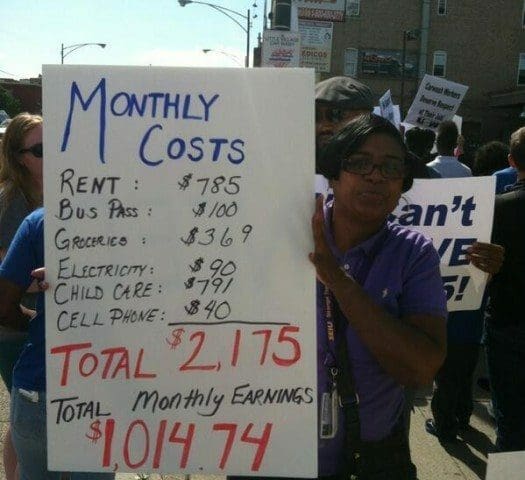
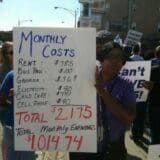
Something is happening among our low-wage workers in America.
Is the ghost of the Occupy movement stirring?
Probably, but maybe more. In just one astonishing week recently, the Seattle Times—a newspaper not known for being pro-labor—featured worker protests either as the lead story or prominently in the paper:
» Read more about: Behind the Stirring Among Low-Wage Workers »


Dear Brother,
In my job I use
a tiny torch
it opens and closes as I stitch
metal with a syringe of light
bright as a drop of sun. I try
not to look but two white spots
burn at the back of my eyes.
In one I see
the other jobs I’ve had –
cleaning up inn rooms
— someone else’s stain.
In the other: years
nearly starving on the farm
never enough, no wheels, no
way to town.
Between
these two spots the men
who wanted something and me
just trying to make it work.
Possession
implies something remains,
but want is all it is.
Dear Brother,
in little squeezes of light
that whisper and cut
are months and years my history
turned white
in this brazier that captures and holds,
this chamber
where everything
hardens and glows.
——————————————————–——————————————————–
Source: The Dos Passos Review,
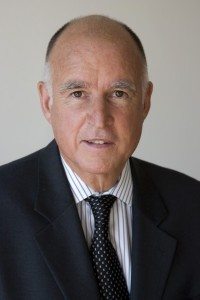

In 2008, Governor Arnold Schwarzenegger signed SB 375, the first piece of legislation in any state that tied transportation choices to greenhouse gas emissions and global warming. The legislation, authored by Senator Darrell Steinberg, required that planning regions create transportation plans that would reduce Greenhouse Gas emissions to 1990 levels by 2020.
As more and more regions adopt these plans, an obvious flaw is emerging. Plans are only as good as the money that exists to implement them. With funding scarce, many of these plans will likely gather dust.
Steinberg went back to work. His first piece of legislation to address this shortfall was vetoed by Governor Brown last year. Brown felt that the timing wasn’t right for legislation that gave municipalities the power to create agencies similar to the Community Redevelopment Agencies he had just ordered dismantled. That didn’t stop Steinberg from reintroducing similar legislation,
» Read more about: Will Jerry Brown OK Sustainable Development? »
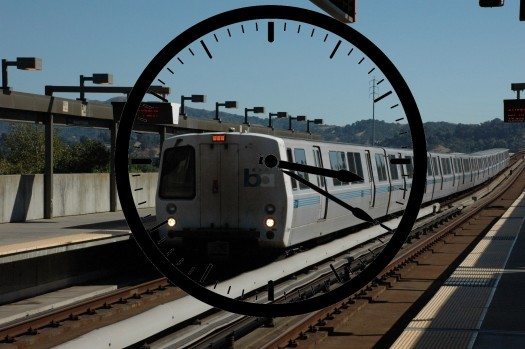

How did the BART dispute ever reach this point?
For several weeks now, BART [Bay Area Rapid Transit] management has mounted a sophisticated PR campaign, stating that its workers are overpaid and unreasonable. But its evidence on employee pay and benefits has been misleading at best; its estimates of average pay include many highly paid managers, thus exaggerating significantly the pay of frontline employees. Likewise, management’s statements on employee contributions to health benefits have failed to account for the significant out-of-pocket expenses incurred by many BART employees.
Denigrating your workers in the media may be a winning strategy in the battle for public opinion, but it’s a foolhardy one for senior management running an organization whose success depends so heavily on employee commitment and flexibility.
This week’s public hearing in Oakland before Governor Brown’s three-member investigative panel provided an entirely different version of events from BART’s media campaign.
» Read more about: Truth Gets Derailed in BART’s Media Campaign »